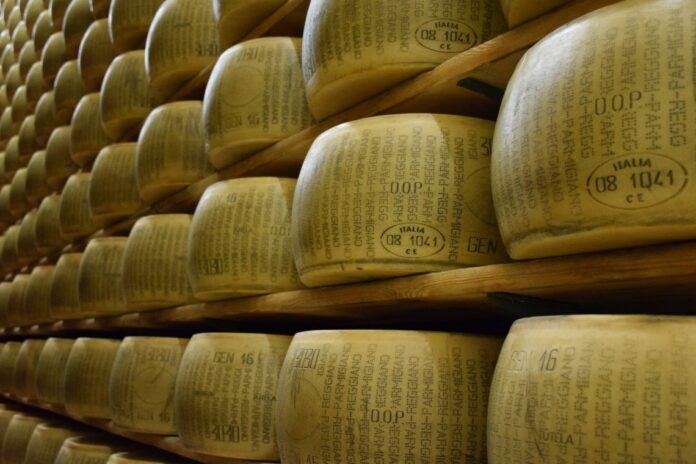Real, authentic Parmigiano Reggiano will soon be blockchain certified, thanks to the installation of edible microchips.
Summary
Parmigiano Reggiano and its blockchain certification through installed edible microchips
According to reports, it appears that Italian producers are using blockchain technology to be wary of imitations of their Parmigiano Reggiano.
Basically, thanks to the installation of edible microchips in the 90-pound wheels, it is now possible to authenticate which is the real Parmigiano Reggiano, from other fake cheeses.
Specifically, the microchips are new silicon chips, produced by Chicago-based company p-Chip, that use blockchain to certify data that can trace back to the producer of the milk used.
The pilot project has been live for a year, and is now at an advanced stage as the chips have been tested on more than 100,000 wheels of Parmigiano.
This is happening because the producer consortium wants to be sure that the chips can meet the aging requirements for Parmigiano, which is at least one year and can exceed three years for some varieties.
Blockchain-certified Parmigiano Reggiano: how do edible microchips work?
From testing, it is possible to say that the new edible microchips installed in Parmigiano Reggiano wheels, the p-Chips, survive any temperature and can withstand years of storage in liquid nitrogen.
Not only that, along with such microchips, Parmigiano producers also use QR codes, which are easily copied and degraded during the cheese ripening process.
Regarding their “edible” side, the Chicago p-Chips are inserted on top of a casein label of the Parmesan cheese wheel, a small plate made of milk protein widely used in the dairy industry, heated by a robot.
Another peculiarity is that the reading of the chips connected to the blockchain cannot be done remotely. Moreover, tests confirm that such microchips cannot be read once ingested, so that the idea that they can even track people is discarded.
The various tests for a blockchain that certifies “made in Italy”
The blockchain has long been tested for certification, even without the Chicago p-chips, especially for products that are part of the “made in Italy” category, such as the current Parmigiano Reggiano.
Indeed, back in January 2019, Luxochain, a company based in Lugano, Switzerland, began using blockchain to create a digital passport that can uniquely identify a single high-end product.
Basically, the owner can keep within his wallet all the unique digital certificates of ownership of his products, the so-called digital twins of Luxochain-signed products.
In January 2020, on the other hand, Textilechain’s blockchain was used to track the clothes of Stefania Ceccarini’s Goupille line, presented at the Festival della Moda at the Best Western Plus Hotel Universo in Rome.
Made in Italy was also considered by the Italian government, which invested as much as 15 million euros in late 2019 to develop a blockchain-based solution. This is a pilot project presented at the Ministry of Economic Development (or MiSE), with the support of IBM and the collaboration of companies in the textile sector.




